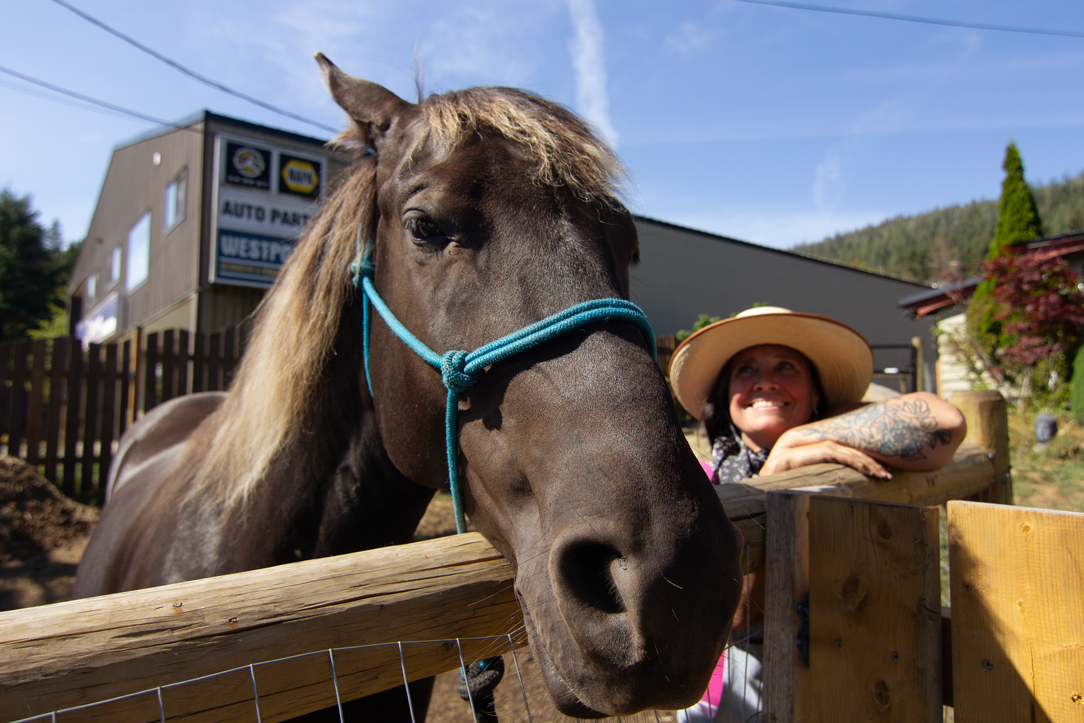Village tangles with welfare concerns; owner says horse is misunderstood
Daajing Giids is a one-horse town but it might not stay so.
In early June, owner Tara Rea began keeping a chocolate-coloured Rocky Mountain Horse named Tango in a small fenced-in paddock by her house on Oceanview Drive.
Locals call the low-lying, mostly residential area “Napa Valley” because of the Napa Auto Parts shop that is right next door.
Rea says she has lived and worked with horses all her life, and Tango is well cared for.
But the Village of Daajing Giids is concerned about the horse’s welfare. Staff will seek legal advice on whether keeping a horse in that part of town breaks its backyard-livestock bylaw.
“I don’t think we ever expected to have a horse in a town-sized lot in this community,” said Mayor Lisa Pineault, noting that until Haida Gwaii has a shared or contract bylaw officer, enforcing bylaws falls to village staff.
“Hopefully we can get it resolved with the person and the best interests of the animal are upheld,” she said. “I am getting a lot of conversation from community members about it.”
Pineault said some people are concerned the horse doesn’t have enough room to exercise, and that it may get hoof trouble when the fall rains bring mud.
Back when the village made its backyard-livestock bylaw in 2013, Pineault said chickens were the leading concern.
Like most of Daajing Giids, Rea’s property is zoned low-density residential. One permitted use is backyard livestock, defined as “chicken hens, goats, ducks, turkeys and similar animals.”
Other parts of Daajing Giids are zoned rural residential. That zone permits agriculture use, allows for buildings such as barns and stables, and has rules about handling manure.
Tango isn’t likely to come up at the village council, unless there is a zoning amendment.
But on July 8, council did review the BC SPCA’s position statement on horse welfare for information.
Among other things, the BC SPCA says horses should have enough space to roam using all of their gaits — paces such a gallop or canter.
The BC SPCA also says horses need social contact with other horses or equines, such as mutual grooming and play.
For her part, Rea says Tango is backyard livestock, and better suited to the small paddock she built for him than most people realize.
“When he’s feeling fresh, this is his playground,” Rea said.
Rea said Tango has enough room to do all of his gaits — he can walk, canter, lope, gallop, buck when he wants to, even roll in the dirt. His yard has rocks to narrow his path in places so that he walks in longer S-curves.
Rea hired local farmers to build a strong paddock fence, and has a stall by her house to shelter Tango on stormy days. She installed security cameras and posted a sign to discourage people from going into the paddock or feeding Tango.
Rea said she knows horses are herd animals, and they can get lonely. If Tango seemed depressed without another horse friend or a goat, she would have to think about getting him some company.
“But he has taken to people — that’s his herd,” she said, noting people regularly stop by the fence to visit Tango, and many neighbours have signed a letter to support keeping him in town.
“He knows when the school bus comes here. He recognized the voices,” she said. “He whinnies and comes running down here and will call to them.”
At four, Tango is a young horse who could live to be 30.
His Rocky Mountain Horse breed was started by a Rocky Mountain stallion but actually raised in the Appalachian mountains of Kentucky.
“They have been bred to live on mountains, not on pastures. They’re not field animals,” said Rea, adding that Tango eats hay but also shrubs, even roses.
Rea said a Rocky Mountain Horse could get sick living in a grassy field, where the higher-calorie diet could give it colic.
The breed is rare — there are only 25,000 worldwide — and prized for a very smooth trail-riding gait that is kind of like a running walk.
They are also “thinking” horses, Rea said, with a curious, easy-going temperament that makes them less likely to react.
“I would never put a thoroughbred in here — it would just constantly pace.”
To keep his hooves in good shape, Rea plans to put down rubber matting in the fall.
She recently bought a horse trailer and plans to take Tango up to Tlell soon for beach and trail rides together with another horse owner.
But as excited as she is to take Tango on the beach — he loves to roll in sand — Rea said he needed a few months to adjust to town life and to Haida Gwaii after moving from a ranch in Drayton Valley, Alberta.
Noisy logging trucks, motorbikes, and even the three large ravens that often visit might have spooked him at first.
Rea hopes Tango can stay where he is. Many horse owners board their horses away from home, but from Powell River to Bobcaygeon and elsewhere, Rea has always lived by her horses and handled most of their care.
If the village concerns can be resolved so that Tango stays on Oceanview, Rea hopes to eventually have him help offer therapy sessions as part of her work doing victim-services outreach.
“I wanted to give something back to people that can put smiles on their faces,” she said.
“They can come and hang out with a horse, and walk away saying, ‘That’s so much better than dealing with a human.’”
